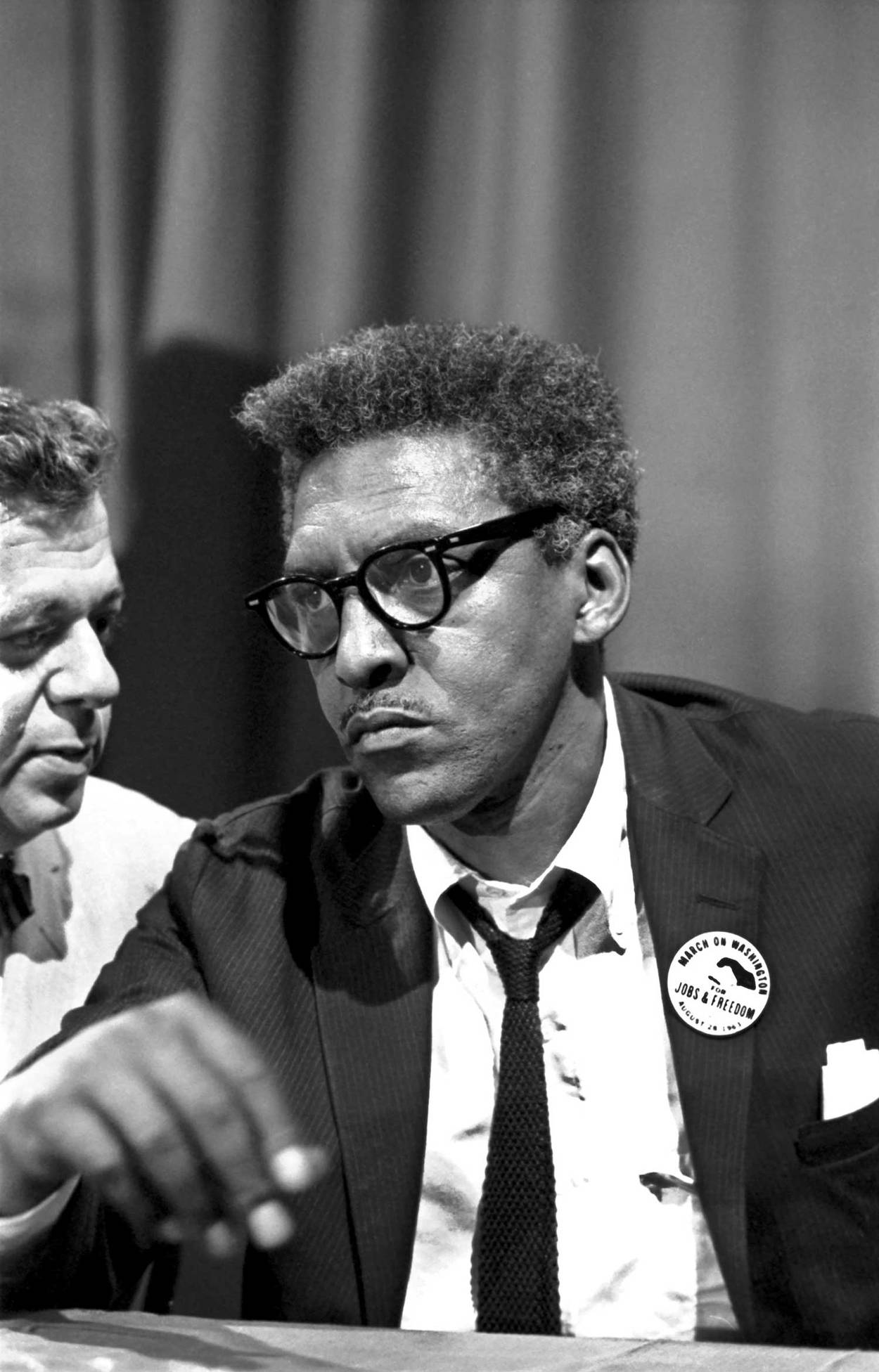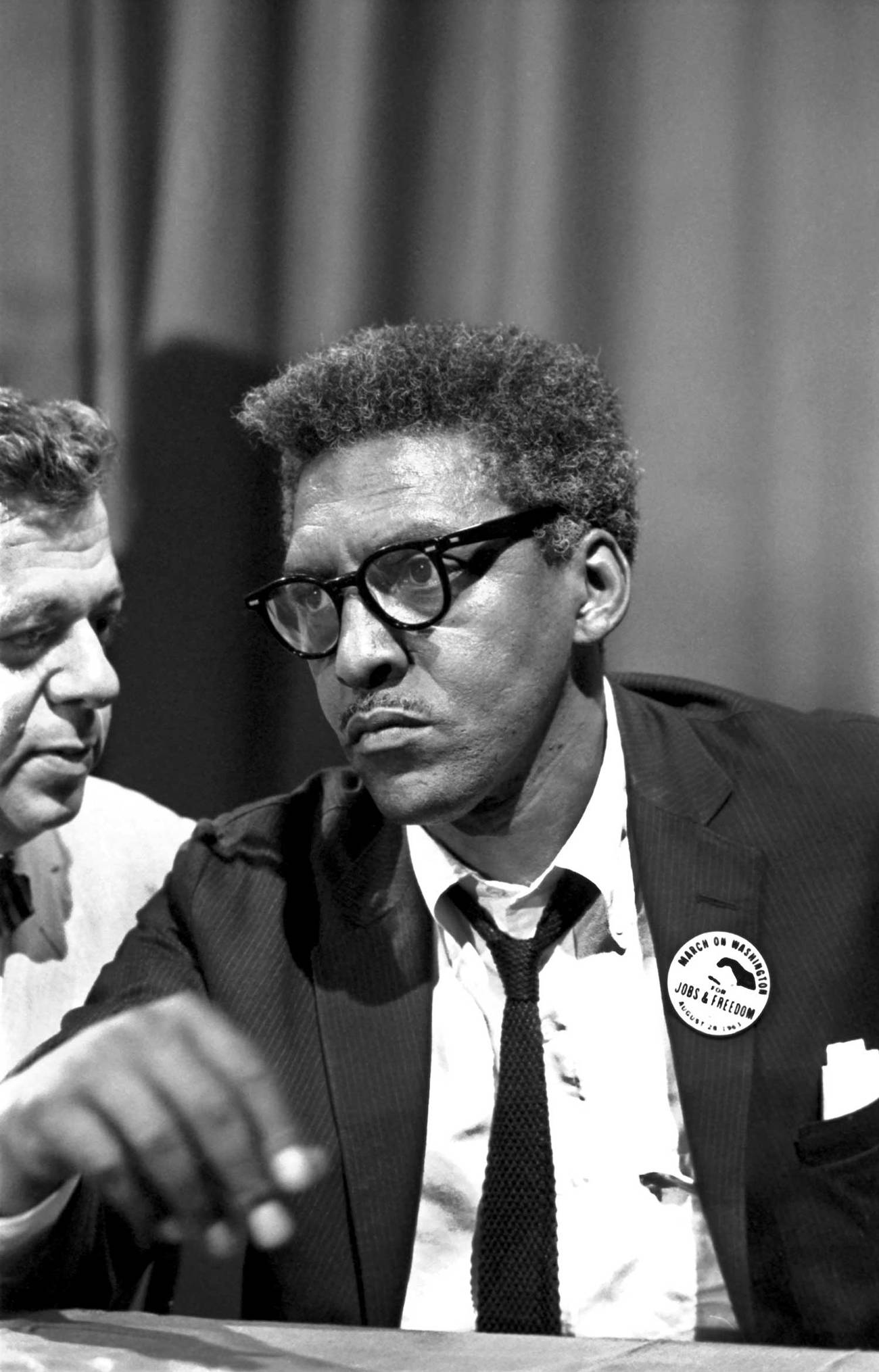During the 1967 Six-Day War and later during the 1973 Yom Kippur War, leaders in America’s democratic socialist movement were staunch allies of Israel. These leaders, notably Michael Harrington, the most prominent theorist and spokesperson of the democratic socialist movement during the 1960s and 1970s, and Bayard Rustin, the renowned civil rights leader and national co-chair of the Socialist Party of America, spoke eloquently of Israel as a democracy surrounded by hostile autocratic governments, and of the history of the Jews and the imperative of a Jewish state. “The basic fact,” Harrington wrote in 1975, “is that Zionism—which I take to mean the philosophy of support for and identification with a Jewish homeland in Israel—is the national liberation movement of a Jewish people asserting their right to self-determination.”
It is worth saying a brief word about their support, given the ongoing protests against Israel by the largest democratic socialist group today, the Democratic Socialists of America (DSA). Since October 7, leaders of the DSA, on a national and local level, have been prominent in blaming Israel for Hamas’ actions, and emphatic in describing Israel as an “apartheid state.”
What changed? Why? What’s next?
Michael Harrington rooted his support for Israel in his core values of democracy and self-determination. At a time when the Soviet Union and other authoritarian regimes threatened to expand their rule, Israel, as the only democracy in the Middle East, emerged as a key ally of the United States. More importantly, Harrington believed that the history of the Jewish people meant that only a recognized Jewish state could fulfill Jewish self-determination.
In May 1967, when Egypt blocked the Straits of Tiran, threatening to choke Israel’s economy, Harrington quickly became part of the blockade opposition and its calls for White House intervention. The next month, during the Six-Day War and its aftermath, Harrington rallied support for Israel among socialists in America and internationally. He did this again in October 1973 when Israel’s survival hung in the balance.
While others on the left supported the Palestine Liberation Organization (PLO) in the 1970s, Harrington was unsparing in his criticism of the PLO and its college student supporters in the United States. He described these students as activists who “romanticized a distant, noble third world which was to save them from their own irrelevance.”
When in 1975, the United Nations passed its resolution equating Zionism with racism, Harrington angrily denounced it, writing: “If one preposterously charges that Zionism is racism, then so are all nationalisms which joined to condemn it at the U.N. And that is to drain the concept of racism of any serious meaning.” Later in 1975, Harrington reiterated his support for the Jewish state in an interview with Mitchell Cohen. He singled out antisemitism among young Jews on the left as a motivator of anti-Israel activity. “It’s a cliché already,” he said, “but some young Jewish leftists feeling a need to prove their commitment to socialism and internationalism, had to be more anti-Israel than anyone else.”
Harrington never wavered in his support of Israel until his death in 1989.
Harrington’s close colleague and friend Bayard Rustin also refused to be silent when Israel was under threat. Rustin is best known for his role in the Civil Rights movement of the 1950s and 1960s. He was among the founders of the Southern Christian Leadership Conference, an adviser to the Rev. Martin Luther King Jr., and one of the two main organizers of the 1963 March on Washington for Jobs and Freedom. But as Cathy Young shows in her fine 2013 essay on Rustin, “The Civil Rights Movement’s Unsung Hero,” Bayard was also passionate and unswerving in his support for Israel.
In an oft-cited declaration, Rustin explained that “Since Israel is a democratic state surrounded by essentially undemocratic states which have sworn her destruction, those interested in democracy everywhere must support Israel’s existence.” He described Israel’s neighbors as cultivating Israel-hatred to divert attention from their own failures to help their people.
In 1970, Rustin, then executive director of the A. Philip Randolph Institute, organized a bipartisan campaign to urge the United States to supply Israel with fighter jets for Israel’s defense. He did this despite opposition from former colleagues at the War Resisters League. He also created Black Americans in Support of Israel (BASIC), an organization founded to bolster America’s backing of Israel, following the 1975 U.N. resolution.
John Rothmann, scholar of the Middle East and co-author of Icon of Evil: Hitler’s Mufti and the Rise of Radical Islam, brought Rustin to San Francisco in 1976 to speak at the annual dinner of the Zionist Organization of America. Rothmann recalls: “Rustin held the room spellbound as he spoke and sang using the spirituals of his Christian faith celebrating his love of Israel.”
The two developed a friendship, and in 1982, Rothmann joined Rustin at the Western Wall in Jerusalem. “Bayard insisted on coming to Israel at that time. He wanted to stand in solidarity with Israel and the Jews of the world. We prayed and cried together at the Western Wall.”
Rothmann reached out to Bayard a few years later when Jewish students were under siege at Case Western University. “I called Bayard on behalf of the students to ask for his help. He immediately volunteered to fly to Cleveland at his own expense, to meet and speak with Black and Jewish students about his support for Israel and Zionism.”
As John D’Emilio describes in Lost Prophet: The Life and Times of Bayard Rustin, Rustin believed that Blacks and Jews are linked by their “commitment to human rights and freedom” and part of the “international party of human rights.” He described the embrace of Yasser Arafat by some young Black activists as a repudiation of the legacy of Martin Luther King Jr.
Since Israel is a democratic state surrounded by essentially undemocratic states which have sworn her destruction, those interested in democracy everywhere must support Israel’s existence.
Though Harrington and Rustin were the most high-profile democratic socialists to support Israel, their views were shared by the majority of democratic socialists at the time. The Socialist Party, Young People’s Socialist League, and Democratic Socialist Organizing Committee (DSOC) all included the support of Israel as planks in their platforms. At the time of the 1973 war, members of the newly formed DSOC overwhelmingly approved a resolution calling on the United States to ensure Israel’s survival.
It would take the coming together of a number of forces in the mid-2010s to undermine democratic socialist support for Israel. Historian Ronald Radosh chronicled these forces, and points to a handful of key changes that have taken place in the 21st century.
The first is the growth of the Democratic Socialists of America following Occupy Wall Street and the Bernie Sanders campaign, which brought in younger members, mainly in their 20s and 30s. At its formation in 1982, the DSA had around 5,000 members nationwide; by 2016 that number stood at 25,000 members. The 2016 Bernie Sanders campaign doubled the organization’s size in two years, and by 2021 the group reported nearly 95,000 members. Unlike earlier democratic socialists, these new members were now 70 years removed from the Holocaust, and had few if any memories of Israel as a struggling nation.
Second, the Boycott, Divestment, and Sanctions (BDS) movement of the mid-2010s spread rapidly across America’s universities. BDS equated Israel’s treatment of Palestinians with apartheid South Africa’s treatment of Blacks. Radosh quotes from a resolution passed by the DSA at its August 2017 convention declaring “solidarity with Palestinian civil society’s nonviolent struggle against apartheid, colonialism and military occupation.” Longtime democratic socialists denounced BDS and some left the organization. But for the majority of new members, support for BDS became a badge of progressive authenticity.
Third, the doctrines of intersectionality and decolonization, becoming more popular within America’s universities around the same time as BDS, linked opposition to Israel with other anti-colonial and anti-racist movements, including with Black Lives Matter. As Radosh puts it: “One cannot be opposed to racism against African Americans in the United States without being opposed to the oppression of ‘people of color’ abroad. Hence to be a ‘progressive’ anti-racist in the U.S, one must also fight Israel’s supposed racism against the Palestinian people.”
By 2020, opposition to Israel was among the central tenets of the DSA. Thus the response of DSA leaders and members to the massacre on October 7 was neither new nor surprising. Even Dissent magazine, the leading voice of democratic socialism since the 1950s, whose past editors included Michael Walzer and Irving Howe, has followed the DSA line in blaming Israel.
October 7, DSA, and Liberal Jews
Soon after October 7, Dissent carried an exchange between two Dissent editorial board members, Joshua Leifer, who also writes for Jewish Currents, and Gabriel Winant, who is an assistant professor at the University of Chicago. The exchange was meant to highlight the differences in views between these members. But the foundation of both pieces was the same: Israel is the aggressor in the Middle East and bears responsibility for Hamas’ actions. Winant even questions whether the dead in Israel should be publicly grieved. He writes of the Israeli “grief machine” that in turn serves to justify Israel’s aggression, concluding, “It is not possible to publicly grieve an Israeli Jewish life lost to violence without tithing ideologically to the Israel Defense Forces—whether you like it or not.”
Since October 7, the rabbis at my congregation in San Francisco, Congregation Emanu-El, have urged their congregants to reach out to other communities in San Francisco to discuss Israel’s history and the current situation. This is good advice. But at this point, no amount of reasoning or facts are likely to change the current DSA hostility to Israel.
In Ignazio Silone’s 1936 novel Bread and Wine, the recent university graduate Don Paolo seeks to use his reading and learning to improve the lot of the peasantry. When he goes out to the villages, though, he discovers the theories of his professors on the agrarian question bear no relation to the realities of peasant life. Don Paolo determines to free himself from the empty ideology of the university so he might be able to truly serve others. It will take a similar willingness to break from BDS, along with intersectionality and decolonization ideologies, before the current DSA makes any policy shifts.
A reconsideration and recalibration of a different form, though, is taking place. Since October 7, Jewish liberal Democrats in California, who were previously part of or sympathetic to the left, are waking up. In recent years, liberal Democrats in California (the largest segment of California’s Jews) have turned a blind eye to the forces of antisemitism on the left, but for the first time, we are beginning to hear liberal Jews, even in San Francisco, express alarm over the chants of “Death to Israel” and “From the River to the Sea” coming from the marches and rallies in California organized by the DSA and other groups on the left.
They tell us who they are, as Bari Weiss said recently of the anti-Israel left, and liberal Jews are finally beginning to listen.

